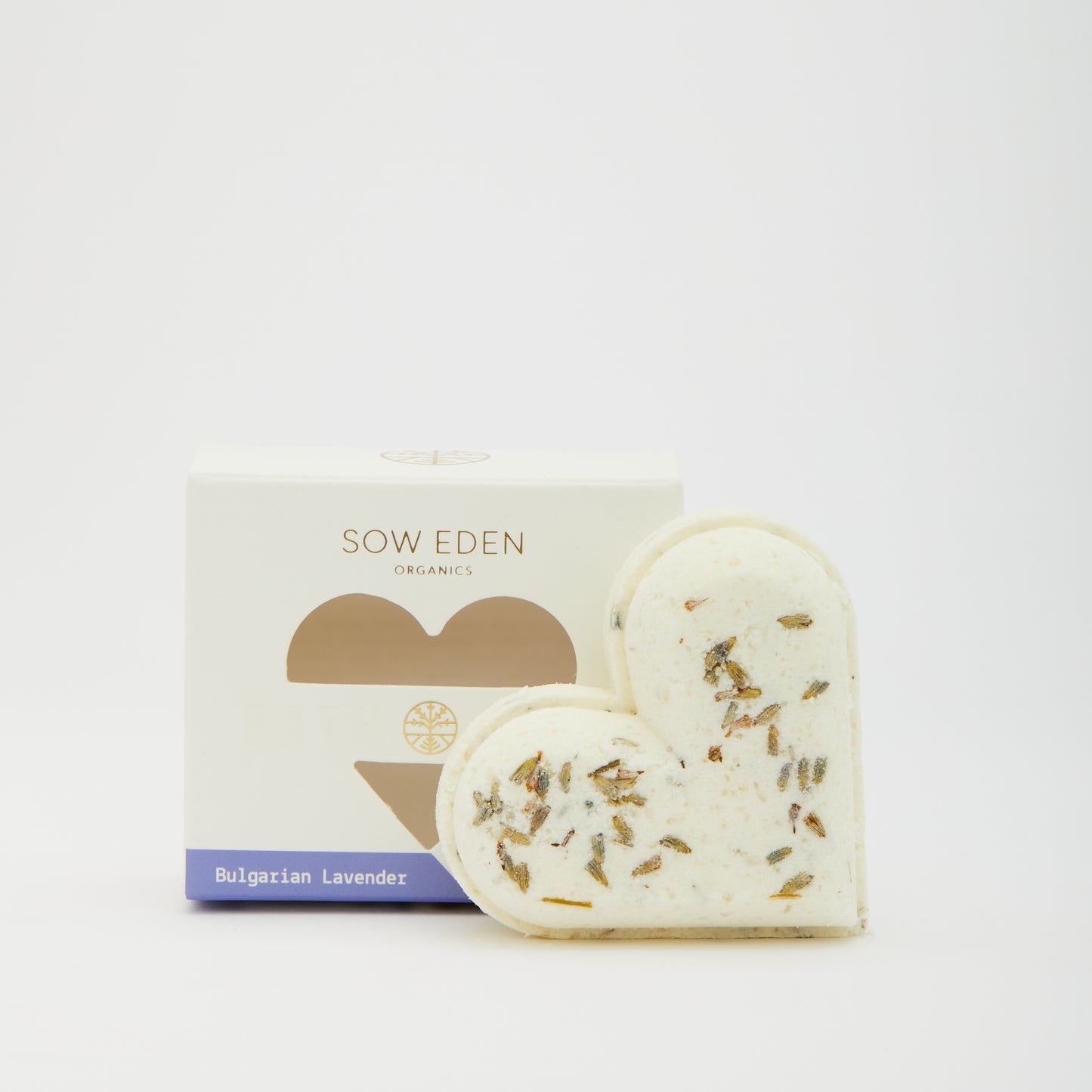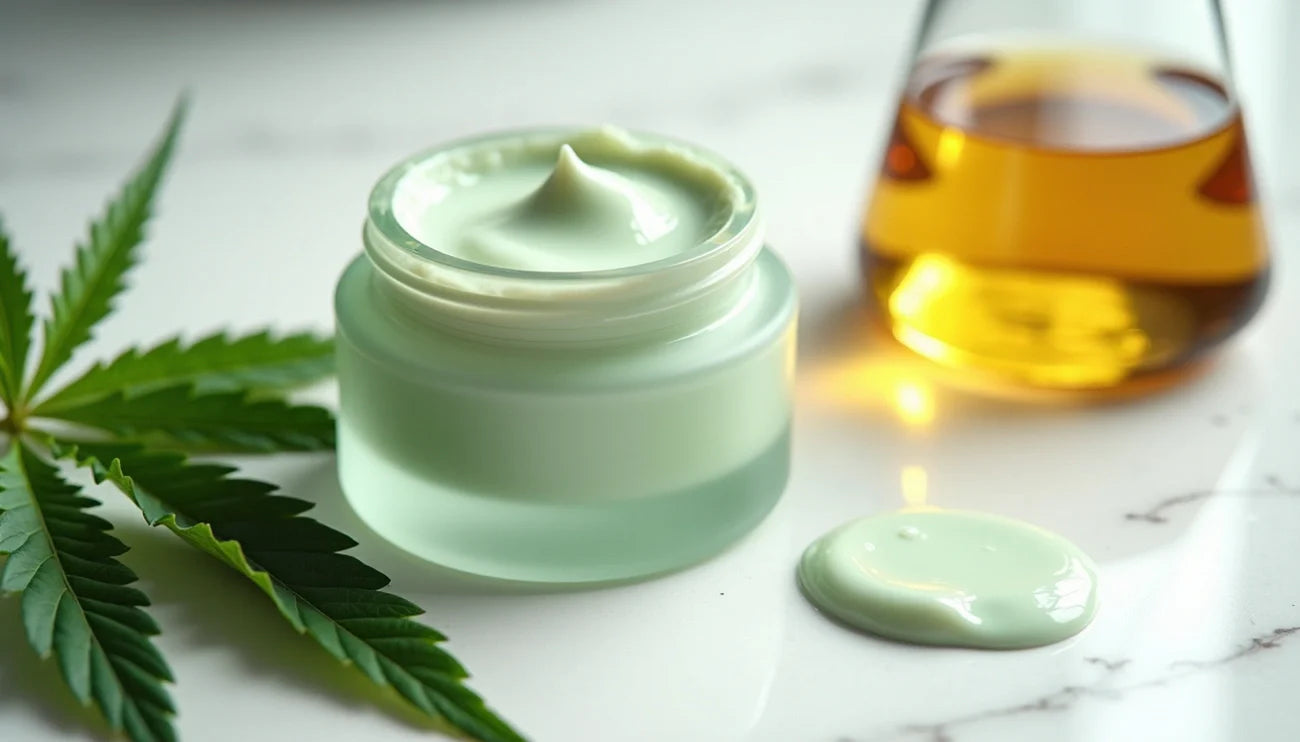Understanding CBD's Impact on Heart Health
CBD benefits for heart health include potential blood pressure reduction, decreased inflammation, improved cholesterol profiles, and protection against oxidative stress. Research suggests CBD may offer cardiovascular support through several mechanisms:
- Blood Pressure Management: A 2017 study found a single 600mg dose of CBD reduced resting blood pressure in healthy volunteers
- Anti-inflammatory Effects: CBD shows promise in reducing vascular inflammation, a key factor in heart disease
- Cholesterol Balance: Animal studies indicate CBD may increase HDL ("good") cholesterol while lowering LDL ("bad") cholesterol
- Stress Response: CBD may help blunt cardiovascular responses to stress
- Antioxidant Protection: CBD has demonstrated antioxidant properties that may protect heart tissue
Heart disease remains the leading cause of death in the United States, claiming approximately 655,000 American lives annually. As conventional treatments often come with significant side effects, many people are exploring natural alternatives to support cardiovascular wellness.
CBD (cannabidiol) is a non-intoxicating compound derived from the cannabis plant that interacts with the body's endocannabinoid system—a complex cell-signaling network involved in regulating various physiological processes, including cardiovascular function.
I'm Jacob Dunn, CEO of Sow Eden Organics, where my background in holistic wellness has led me to extensively research CBD benefits for heart health while developing our broad-spectrum formulations that prioritize cardiovascular wellness.
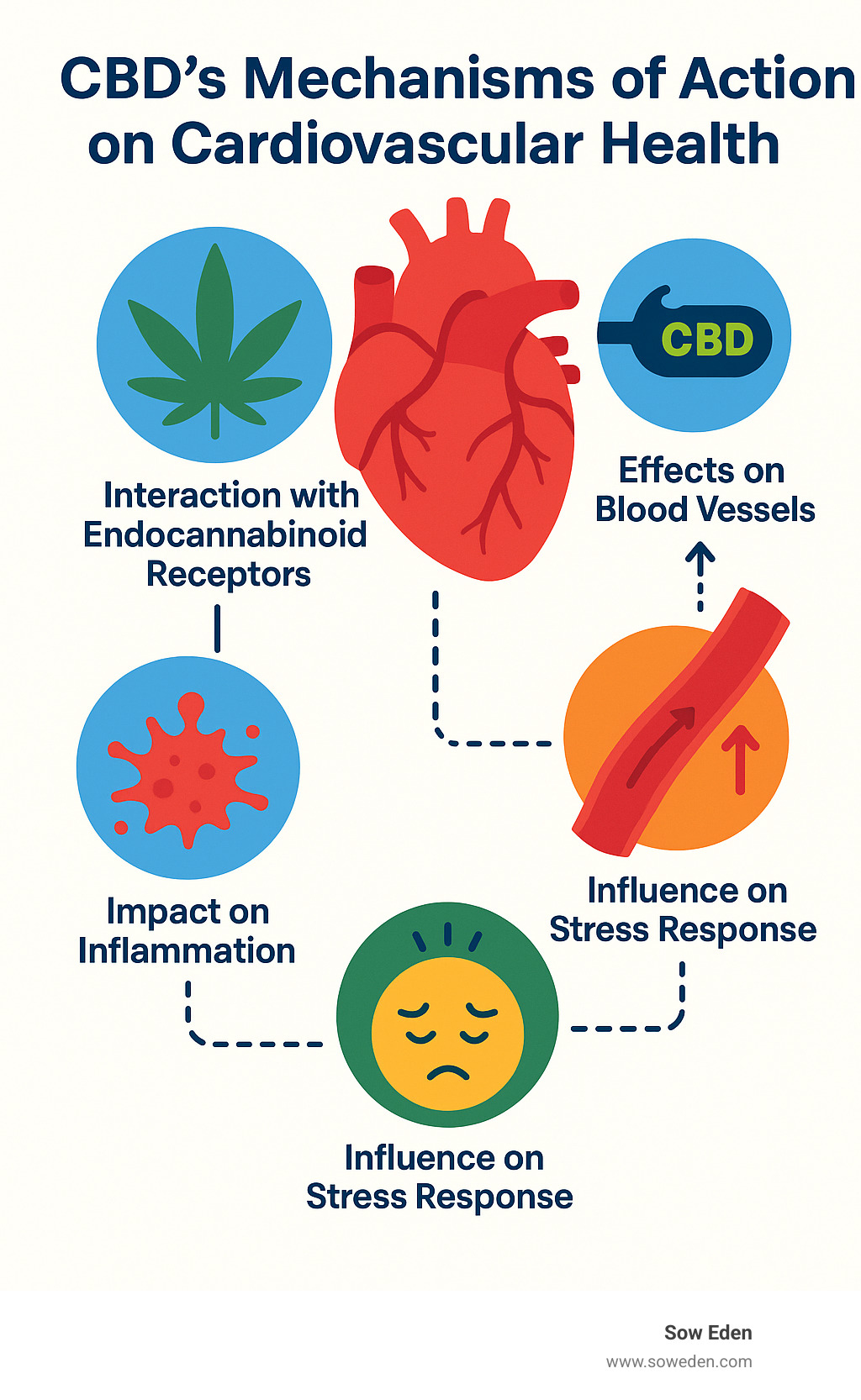
Quick cbd benefits for heart terms: - hemp oil benefits - benefits of hemp oil for hair - hemp oil benefits for hair
CBD 101: How CBD Differs From THC & Hemp Oil
Let's clear up some confusion before we dive deeper into the CBD benefits for heart health. CBD (cannabidiol) is just one star in a constellation of over 100 cannabinoids found in the Cannabis sativa plant. Unlike its cousin THC (tetrahydrocannabinol), CBD won't get you high or make you raid the refrigerator at midnight. It's non-intoxicating, which is great news for those seeking wellness without the wooziness.
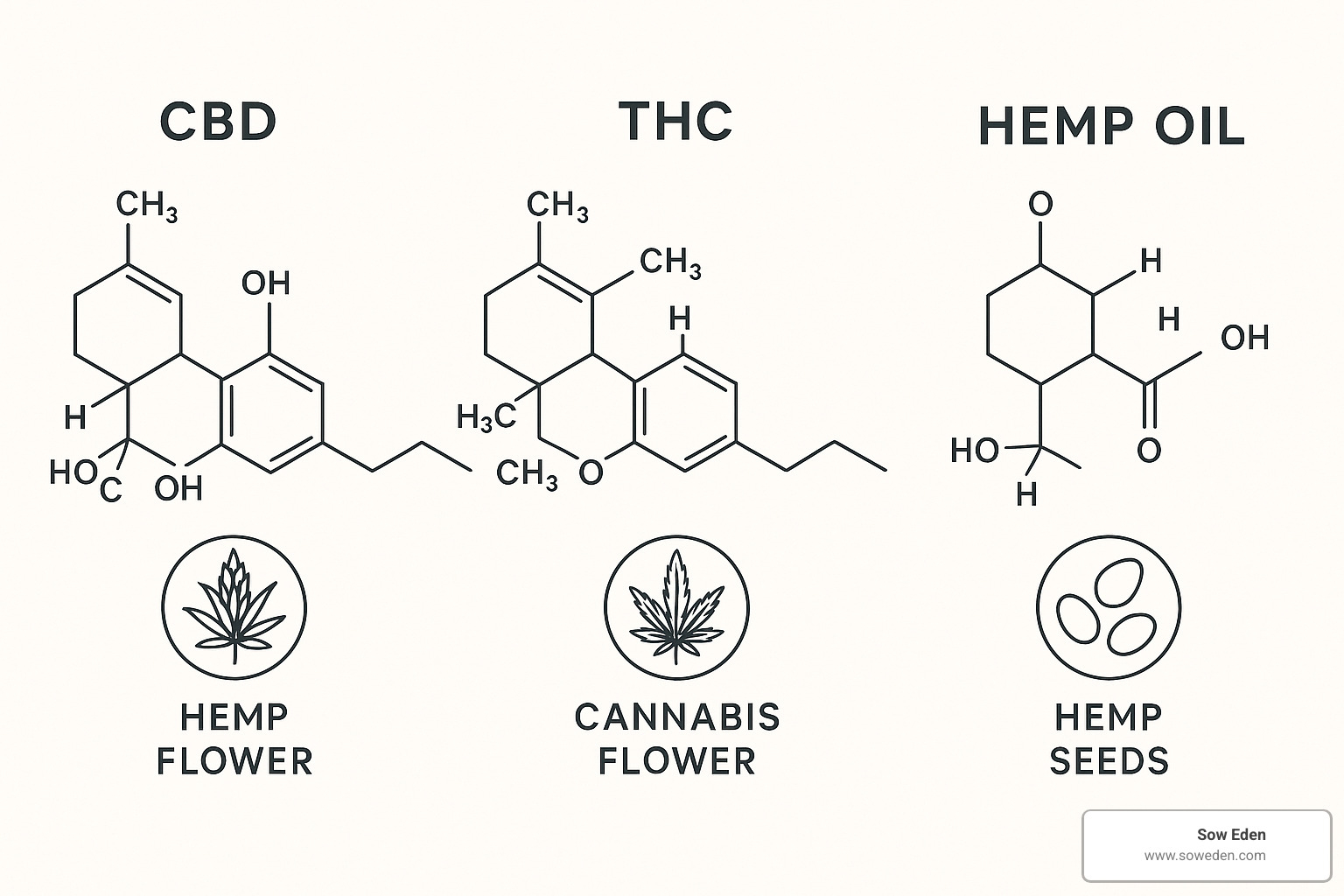
People often mix up hemp oil and CBD oil at family dinners and in shopping carts alike. Hemp oil (sometimes called hemp seed oil) comes from pressing hemp seeds and contains virtually no CBD. Think of it as the nutritious cousin – packed with omega fatty acids and antioxidants, but not bringing cannabinoids to the party.
CBD oil, however, is extracted from the flowers, leaves, and stalks of hemp plants specifically bred to be CBD-rich while containing minimal THC (legally less than 0.3% in the United States). This distinction matters tremendously when we're talking about CBD benefits for heart health, since these compounds interact with our bodies in completely different ways.
Key Chemical Distinctions
When you're shopping for CBD products, you'll notice three main types on the shelf:
CBD isolate is like the minimalist of the bunch – just pure CBD with everything else stripped away. Broad-spectrum CBD keeps the beneficial supporting cast of cannabinoids and aromatic terpenes while removing THC completely. Full-spectrum CBD includes the whole plant family reunion – CBD, trace amounts of THC, and all the terpenes and flavonoids that naturally occur in the plant.
At Sow Eden, we've fallen in love with broad-spectrum formulations improved with CBD-A and CBG-A (the acidic precursors that transform into CBD and CBG). We pair these with botanical ingredients like Ginger Root and Lemon Peel. This creates a more complete "entourage effect" – where compounds work better together than alone – without any THC in the mix.
Why "Non-Intoxicating" Matters for the Heart
The non-intoxicating nature of CBD is particularly important when we're talking about heart health. THC, despite having some potential benefits, can temporarily increase heart rate and blood pressure, especially if you're new to it. This happens largely because THC binds strongly to CB1 receptors in the brain and cardiovascular system, potentially triggering a stress response.
CBD works differently. Rather than latching onto CB1 receptors (which can sometimes trigger anxiety and cardiovascular stress), CBD gently modulates the endocannabinoid system and interacts with multiple receptor types. It shows particular affinity for CB2 receptors, which play key roles in regulating inflammation and immune function.
This gentle approach helps explain why CBD may support cardiovascular wellness without the concerning heart effects sometimes linked to THC. For those seeking natural support for heart health, the ability to potentially gain benefits without any mind-altering effects makes CBD particularly appealing.
Think of it this way: CBD works with your body's natural systems rather than overriding them, making it a thoughtful addition to a heart-conscious wellness routine.
The Endocannabinoid System & Cardiovascular Function
Your body has an amazing built-in network that helps maintain balance in nearly every system—including your heart. This network, called the endocannabinoid system (ECS), works quietly behind the scenes as your body's natural wellness coordinator.
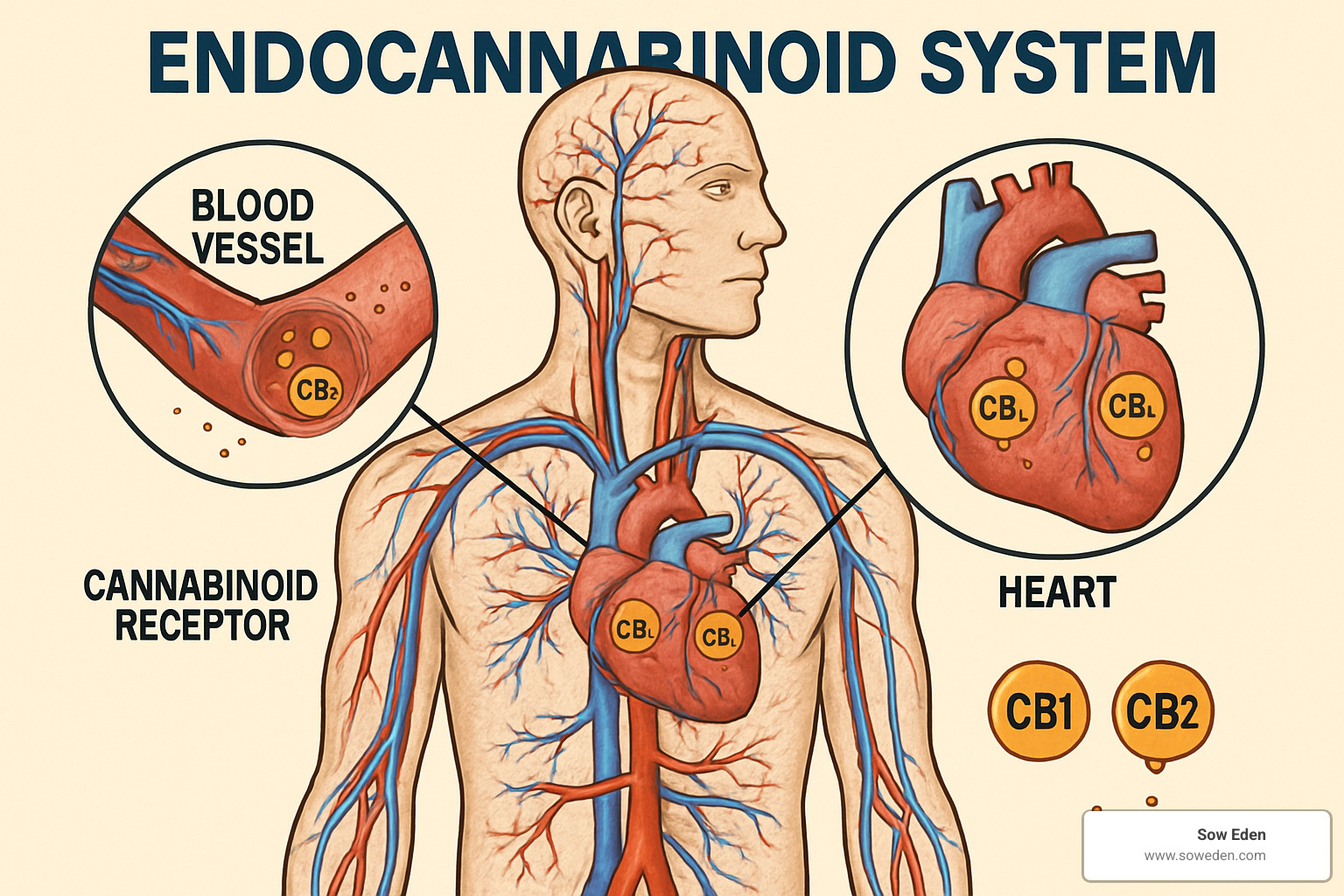
Think of the ECS as your body's internal balance keeper. It consists of naturally produced cannabinoids (endocannabinoids), specialized receptors throughout your body, and enzymes that build and break down these compounds. Together, they create a communication network that helps regulate everything from mood to—you guessed it—heart function.
What makes this system so fascinating for heart health is how deeply it's woven into cardiovascular regulation. Your ECS helps control blood pressure by influencing vascular tone (how relaxed or constricted your blood vessels are). It plays a role in managing inflammation in your circulatory system. It even helps regulate your heart rate through its connections with your autonomic nervous system—the part that controls unconscious bodily functions.
When we talk about CBD benefits for heart health, we're really discussing how CBD supports this natural system that's already working to protect your heart.
ECS Signaling in Blood Vessels
Let's zoom in a bit. Your blood vessels are lined with cannabinoid receptors, making them responsive to both your body's natural endocannabinoids and plant cannabinoids like CBD.
One particularly important endocannabinoid is anandamide (whose name delightfully comes from the Sanskrit word for "bliss"). Anandamide helps your blood vessels relax and widen—a process called vasodilation. CBD appears to boost anandamide levels by preventing the enzyme that breaks it down (FAAH) from doing its job.
CBD also interacts with something called TRPV1 receptors—the same receptors that respond to the heat in chili peppers! When activated, these receptors trigger the release of nitric oxide, a molecule that tells your blood vessel walls to relax, potentially improving blood flow and helping maintain healthy blood pressure.
As cardiovascular researcher Dr. Saoirse O'Sullivan noted in her studies: "CBD causes both acute and time-dependent vasorelaxation in isolated arteries... and improves endothelium-dependent relaxation." In simpler terms, CBD seems to help blood vessels chill out and function better.
Cardiac Cells & Cannabinoid Receptors
Your heart muscle cells (cardiomyocytes) also contain cannabinoid receptors, suggesting they're designed to respond to these compounds. Research indicates CBD may offer direct protective effects on these cells, particularly during stressful conditions.
One of the most promising areas of research involves ischemia-reperfusion injury—the damage that occurs when blood flow returns to tissue after a period without oxygen. Think of it like the harm that happens when a garden hose that's been kinked suddenly gets straightened—that rush of water can cause damage.
In laboratory studies, CBD treatment reduced the size of damaged areas and improved heart function following induced heart attacks. While we need more human studies, these findings suggest CBD may help shield heart cells during cardiovascular stress.
At Sow Eden, we believe in working with your body's natural systems rather than against them. Our broad-spectrum formulations combine CBD-A and CBG-A with complementary botanicals like Ginger Root, which has its own heart-friendly properties. This approach aims to support your endocannabinoid system in its ongoing work of maintaining cardiovascular balance—the natural way.
CBD Benefits for Heart Health: What the Science Says
The scientific landscape around CBD benefits for heart health continues to evolve with exciting new findies. While researchers are still exploring this promising field, the evidence we have so far paints an encouraging picture of CBD's potential for cardiovascular wellness.
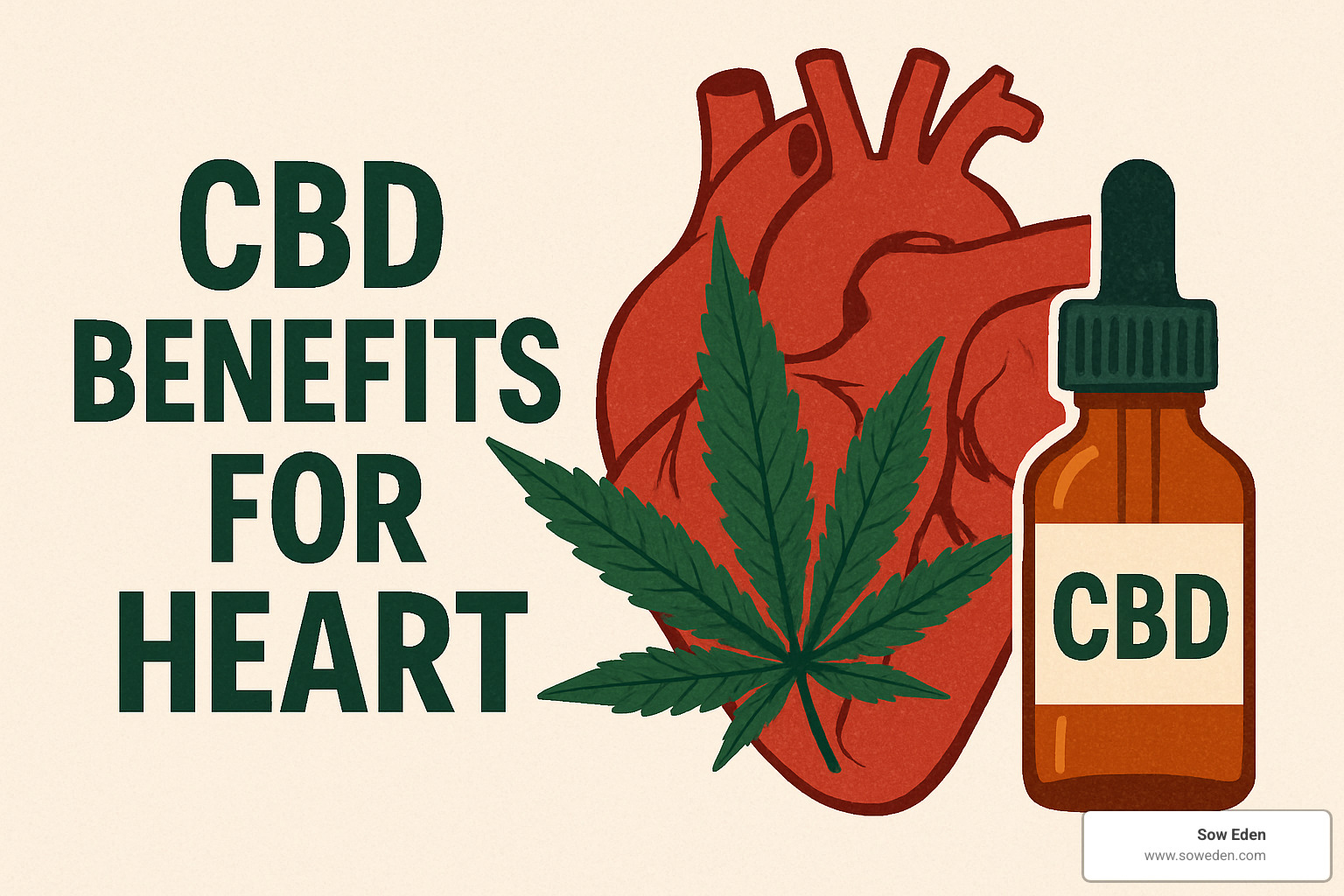
Blood Pressure: CBD Benefits for Heart Circulation
If you're concerned about blood pressure—and many of us should be, as hypertension remains a leading risk factor for heart disease—you'll find the research on CBD particularly interesting.
A groundbreaking 2017 study published in JCI Insight by University of Nottingham researchers caught the attention of the cardiovascular community. In this carefully designed study (randomized, placebo-controlled, double-blind, and crossover), nine healthy men received either a single 600 mg dose of CBD or a placebo.
The results? Pretty remarkable. Resting systolic blood pressure dropped by an average of 6 mmHg after just one CBD dose. Even more impressive, CBD helped maintain lower blood pressure during both physical stress tests (the cold pressor test, where participants plunge a hand into ice water) and mental stress challenges (like performing mental arithmetic under pressure).
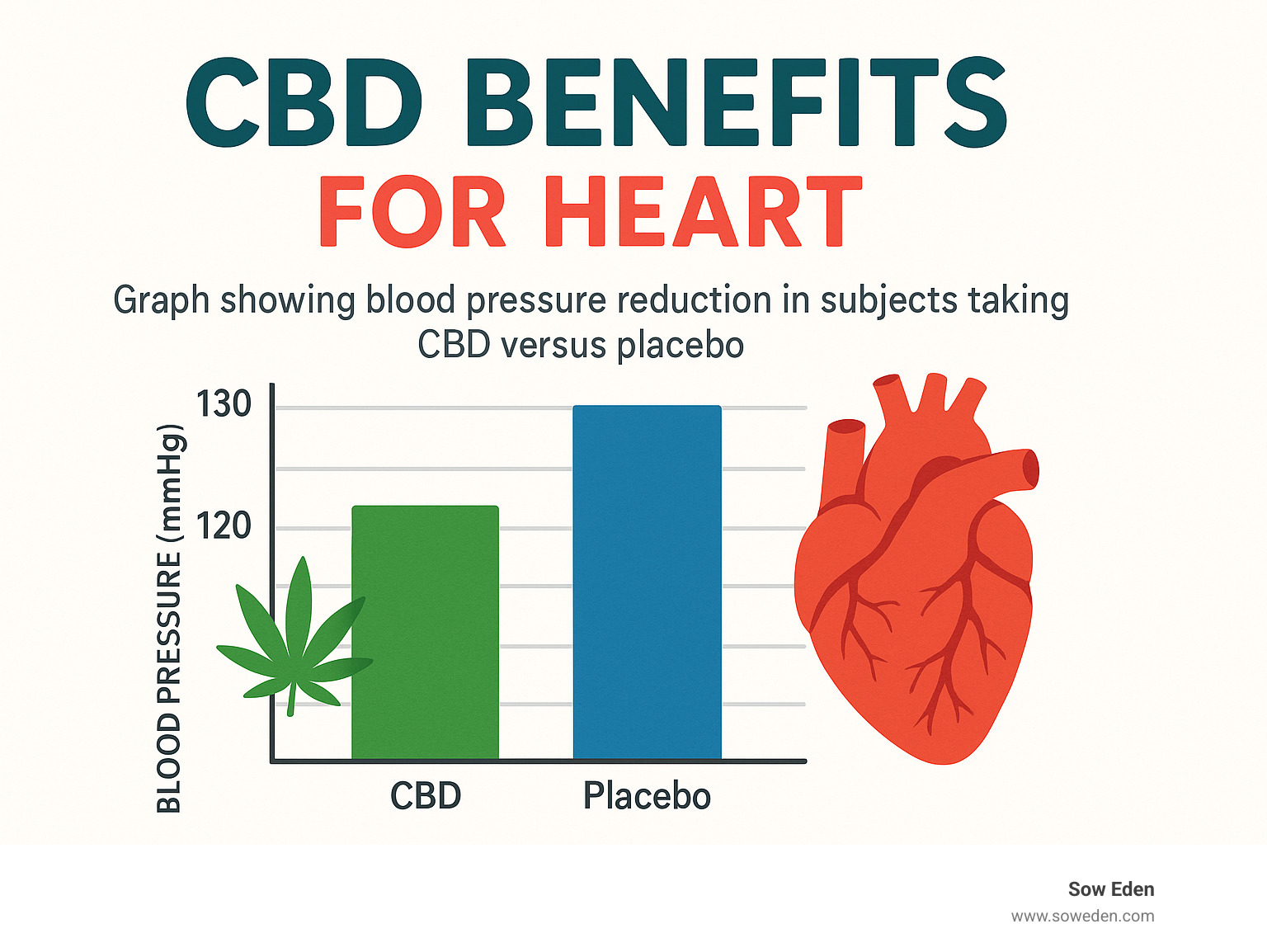
The researchers themselves noted that these findings suggest CBD may have potential applications "for various cardiovascular disorders, such as hypertension, myocardial infarction, and stroke." While this study used a higher single dose (600 mg), it provides compelling initial evidence for CBD's ability to influence blood pressure.
Additional research has found that regular CBD use might improve arterial stiffness and endothelial function—both critical indicators of long-term heart health and vascular wellness.
Inflammation & Cholesterol: CBD Benefits for Heart Disease Risk
We now understand that inflammation isn't just something that happens when you twist an ankle—it's a key player in heart disease development. Chronic, low-grade inflammation contributes to atherosclerosis (that dangerous buildup of fats and cholesterol in artery walls) that can restrict blood flow and potentially lead to heart attacks and strokes.
CBD appears to tackle inflammation through multiple pathways. It helps reduce pro-inflammatory cytokines (those troublemaking signaling molecules that can trigger inflammation), neutralizes damaging free radicals with its antioxidant properties, and helps regulate immune cell activity to keep inflammation responses in check.
A systematic review examining nine preclinical studies found consistent cardiovascular benefits with CBD, particularly notable reductions in both oxidative stress and inflammation markers.
When it comes to cholesterol—another crucial heart health factor—animal studies have shown encouraging results. In one four-week study, CBD supplementation led to improved lipid profiles with higher HDL ("good") cholesterol and lower LDL ("bad") cholesterol levels. While we're still awaiting human studies specifically focused on CBD and cholesterol, these initial findings give us good reason for optimism.
Weight, Metabolism & Habit Change
Heart health isn't just about what happens inside your blood vessels—your lifestyle choices matter tremendously. Maintaining a healthy weight ranks among the most important factors for cardiovascular wellness, and CBD may offer support here too.
Unlike THC (which often triggers the munchies), CBD appears to help normalize appetite patterns. Emerging research suggests CBD may help "brown" white fat cells—essentially turning fat-storing cells into fat-burning cells—potentially supporting healthy metabolism.
Many of us know stress can lead to unhealthy eating patterns. By helping to ease anxiety and stress, CBD might indirectly support heart-healthy eating habits and weight management.
CBD may also support other heart-beneficial lifestyle changes. For those trying to quit smoking (one of the best things you can do for your heart), preliminary research suggests CBD might help reduce cigarette consumption.
For the exercise-minded, CBD's anti-inflammatory properties may aid in recovery after workouts, potentially helping you maintain a consistent physical activity routine—a cornerstone of cardiovascular health.
At Sow Eden, we believe in taking a holistic approach to heart wellness. That's why our formulations thoughtfully combine CBD with complementary botanicals like Ginger Root, which brings its own cardiovascular benefits through anti-inflammatory effects and potential support for healthy cholesterol levels.
When it comes to supporting your heart, nature offers powerful allies—and CBD appears to be one of the most promising ones we're finding in our time. While research continues to unfold, the existing scientific evidence gives us plenty of reasons to be excited about CBD's potential role in heart health.
Safety, Side Effects & Drug–Drug Interactions
While research suggests numerous CBD benefits for heart health, understanding the safety profile of CBD is just as important as knowing its potential benefits. CBD is generally well-tolerated by most people, but like any natural compound that affects our bodies, it comes with considerations worth knowing about.
Most people who try CBD experience either no side effects or mild ones that typically fade as your body adjusts. These can include feeling a bit tired (especially at higher doses), having a dry mouth (keep water handy!), slightly reduced appetite, occasional digestive discomfort, or temporary drops in blood pressure.
These effects are usually dose-dependent – meaning they're more likely to show up when you take larger amounts. This is why we at Sow Eden always recommend the "start low, go slow" approach – begin with a small amount and gradually increase until you find what works best for your body.
For those specifically interested in heart health, it's worth noting that CBD may cause temporary drops in blood pressure. While this could be beneficial if you're dealing with high blood pressure, it might cause a bit of lightheadedness when you first start taking it, especially if you stand up quickly.
A more serious consideration emerged in a 2022 case report published in HeartRhythm Case Reports. Researchers described a 56-year-old woman who experienced a dangerous heart rhythm disturbance after taking hemp oil containing CBD and CBG at six times the recommended dose. This rare case highlights why following recommended dosages matters – as with any wellness product, more isn't necessarily better.
Who Should Avoid CBD or Consult a Doctor First
Your heart health is too important to leave to chance, which is why certain people should talk with their doctor before trying CBD:
If you're taking heart medications, a conversation with your doctor is essential. CBD can interact with several common heart medications by affecting how your liver processes them. People with existing heart rhythm disorders should be particularly cautious and get medical guidance first, given the case report mentioned above.
Pregnant or breastfeeding women should wait on CBD due to limited safety research. Those with liver disease should also exercise caution since CBD is processed by the liver. And if you already have low blood pressure, the pressure-lowering effects of CBD might not be ideal for you.
The biggest consideration for heart patients involves potential drug interactions. CBD is processed by the same liver enzyme system (cytochrome P450) that metabolizes many common medications. This creates what's known as the "grapefruit effect" – similar to how grapefruit juice can affect medication levels, CBD may increase or decrease the concentration of certain drugs in your bloodstream.
Medications that might interact with CBD include blood thinners like warfarin, antiarrhythmic drugs like amiodarone, beta-blockers, calcium channel blockers, statins, and some blood pressure medications.
How to Talk With Your Cardiologist
Having an informed conversation with your cardiologist about CBD doesn't have to be awkward. Here's how to approach it:
Be completely honest about your interest in CBD. Your doctor needs the full picture to give you the best advice. Bringing information about CBD and heart health can help frame the conversation – many doctors appreciate patients who take an active role in their wellness journey.
Ask specifically about potential interactions with your current medications and whether CBD might complement or complicate your treatment plan. If your doctor approves CBD use, work together to establish how you'll monitor your heart health while using it.
At Sow Eden, we believe your healthcare provider should be a partner in your wellness decisions. Our customer service team is always available to provide detailed information about our products that you can share with your doctor. We're happy to answer any questions that help facilitate these important conversations.
Your health journey is personal, and finding the right approach often means working with healthcare professionals who understand both conventional and complementary approaches to wellness.
Choosing & Using CBD for Cardiovascular Wellness
With growing interest in CBD benefits for heart health, finding the right product can feel overwhelming. Let's simplify the process and explore how to select CBD that truly supports your cardiovascular wellness journey.
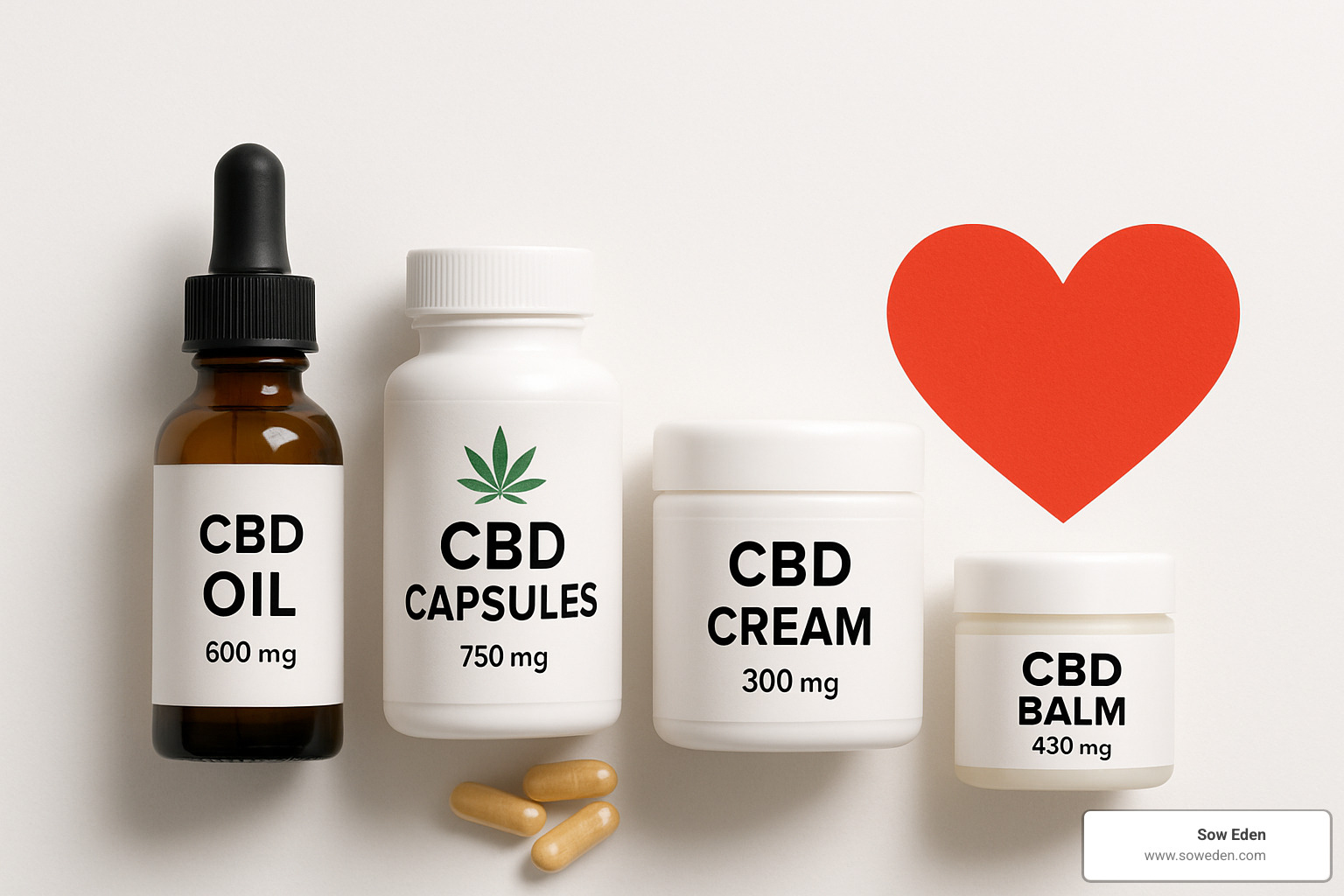
When shopping for CBD, you'll encounter three main types, each with unique characteristics. CBD isolate offers pure cannabidiol with no other compounds—perfect if you want precise dosing without THC, though you'll miss out on the beneficial "entourage effect" from other plant compounds. Broad-spectrum CBD delivers multiple cannabinoids and terpenes without THC, providing improved benefits through compound synergy. Full-spectrum CBD contains all naturally occurring hemp compounds including trace amounts of THC (≤0.3%), maximizing potential therapeutic effects.
Here at Sow Eden, we've thoughtfully developed broad-spectrum formulations improved with CBD-A and CBG-A. We believe this approach offers the perfect balance—multiple cannabinoids working harmoniously together without THC. Our addition of complementary botanicals like Ginger Root and Lemon Peel creates a truly holistic approach to heart wellness.
| Type | Description | Potential Heart Benefits | Considerations |
|---|---|---|---|
| CBD Isolate | Pure CBD only | Precise dosing, no THC | Lacks entourage effect |
| Broad-Spectrum | CBD plus other cannabinoids and terpenes, no THC | Improved benefits through entourage effect, no THC | More complete support than isolate |
| Full-Spectrum | All naturally occurring compounds including trace THC | Maximum entourage effect | Contains trace THC (≤0.3%) |
How you take CBD matters tremendously for heart health. Sublingual tinctures offer good bioavailability (20-30%) with effects beginning within 15-30 minutes—simply hold the oil under your tongue for about a minute before swallowing. Oral capsules provide convenience but lower bioavailability (6-15%) with effects taking 1-2 hours to appear. Topical applications work wonderfully for localized issues but have minimal systemic absorption for cardiovascular support.
For heart wellness, sublingual tinctures typically provide the ideal balance of good absorption, precise dosing, and convenient use. The oils can be easily adjusted drop by drop as you find your perfect amount.
Reading Certificates of Analysis
Think of a Certificate of Analysis (COA) as your CBD product's report card—it tells you exactly what's inside. These third-party lab reports are essential for heart-focused wellness, confirming not just the CBD content but also verifying the absence of potentially harmful contaminants.
A proper COA should verify three crucial elements: accurate cannabinoid content (ensuring you're getting what you paid for), THC levels (confirming they're below the legal 0.3% limit), and contaminant testing (checking for pesticides, heavy metals, solvents, and microbials).
At Sow Eden, transparency is non-negotiable. We provide comprehensive COAs for every product batch, making them easily accessible on our website. This commitment to quality is especially important when selecting CBD for cardiovascular support—you deserve to know exactly what you're putting in your body.
Finding Your Dose & Timing
Finding your ideal CBD dosage is a personal journey—what works beautifully for your friend might not be right for you. Your perfect amount depends on several factors including your weight, individual body chemistry, wellness goals, and the specific product you're using.
While research on CBD benefits for heart health has sometimes used relatively high single doses (like 600mg in blood pressure studies), many people find significant support at much lower doses taken consistently over time.
The "start low, go slow" approach works best for most people. Begin with just 5-10mg once or twice daily, then gradually increase by small increments (5-10mg) every week or two until you find your sweet spot. Keep track of how you feel and any changes in measurable parameters like blood pressure or resting heart rate.
Consistency matters more than quantity—CBD accumulates in the body over time, and some cardiovascular benefits may take several weeks of regular use to become noticeable. Many people find taking CBD at the same times each day helps establish a beneficial routine.
Lifestyle Pairings for Maximum CBD Benefits for Heart
CBD works best as part of a heart-healthy lifestyle, not as a standalone solution. Consider it one instrument in your wellness orchestra—powerful on its own, but truly magnificent when playing in harmony with other healthy habits.
The Mediterranean diet pairs beautifully with CBD's anti-inflammatory properties. Rich in colorful vegetables, fruits, whole grains, fish, and olive oil, this eating pattern supports heart health through multiple pathways that complement CBD's effects.
Regular movement improves circulation and amplifies CBD's cardiovascular benefits. Even moderate activities like a daily 30-minute walk can make a tremendous difference when combined with CBD support.
Stress management practices create powerful synergy with CBD. Consider adding meditation, deep breathing exercises, or gentle yoga to your routine—these practices work hand-in-hand with CBD's calming properties to support healthy blood pressure and heart function.
Quality sleep is non-negotiable for heart health. CBD may help improve sleep quality for many people, creating a beneficial cycle where better rest supports cardiovascular wellness.
At Sow Eden, we believe in this whole-person approach to heart health. Our carefully crafted formulations support not just your endocannabinoid system but your overall wellness through thoughtfully selected botanicals that work in concert with CBD to nurture your cardiovascular system naturally.
Frequently Asked Questions about CBD & Heart Health
Can CBD replace my blood-pressure medication?
No, CBD should not replace prescribed blood pressure medications. While the research on CBD benefits for heart health is encouraging, particularly regarding blood pressure, the evidence isn't comprehensive enough to substitute conventional treatments that have been thoroughly tested and approved.
Think of CBD as a potential teammate rather than a replacement player. If you're curious about adding CBD to your heart health routine, have an honest conversation with your doctor first. They can help determine if CBD might complement your current treatment plan and establish appropriate monitoring to track any effects.
Abruptly stopping prescribed blood pressure medications can be dangerous – it could trigger sudden spikes in blood pressure or increase your risk of serious cardiovascular events. Always make medication changes under medical supervision.
Will CBD raise my heart rate?
Unlike its cousin THC (which can sometimes make your heart race), CBD typically doesn't increase heart rate – and might actually help normalize it. This is one of the key CBD benefits for heart health that makes it appealing for cardiovascular wellness.
Most users experience a calming effect on their cardiovascular system. Research suggests CBD may help your heart maintain a steady rhythm by:
- Reducing how much your heart rate jumps during stressful situations
- Encouraging your nervous system to shift toward "rest and digest" mode
- Potentially offering protection against irregular heart rhythms (based on animal studies)
That said, we're all unique, and some people might notice subtle changes when first starting CBD. If you experience any concerning heart rate or rhythm changes after taking CBD, it's best to pause use and check in with your healthcare provider.
How long before I notice cardiovascular effects?
When it comes to CBD benefits for heart health, patience is key. The timeline varies considerably from person to person:
Some effects might appear relatively quickly – within 30-60 minutes, you might notice reduced anxiety and a calmer stress response, which indirectly benefits your heart.
Blood pressure effects can sometimes be measured within hours (like in that fascinating 2017 study that used a single 600 mg dose), but sustainable changes typically take longer.
The deeper benefits – like reduced inflammation, improved blood vessel function, and better cholesterol profiles – often require weeks or months of consistent use before becoming noticeable.
Your personal timeline depends on several factors: your unique body chemistry, which heart health markers you're monitoring, your CBD product's quality and formulation, your dosing routine, and your overall lifestyle and health habits.
For best results, we recommend giving CBD at least 30 days of consistent daily use before evaluating its cardiovascular benefits. Some of our customers find it helpful to track measurable markers like blood pressure or resting heart rate to objectively assess changes over time.
At Sow Eden, we've formulated our products with heart health in mind, combining CBD with complementary botanicals like Ginger Root that may provide additional cardiovascular support. While individual results vary, many of our customers report feeling a greater sense of overall wellness and balance with regular use – benefits that extend to heart health as part of a comprehensive wellness approach.
Conclusion & Next Steps
The research surrounding CBD benefits for heart health continues to grow, painting an exciting picture of how this remarkable plant compound might support our cardiovascular wellbeing. From blood pressure management and inflammation reduction to heart tissue protection and cholesterol support, CBD offers a multi-faceted approach that many find appealing as part of their natural wellness routine.
At Sow Eden, we've carefully crafted our premium organic CBD formulations with heart health in mind. Our special blend combines broad-spectrum CBD with CBD-A and CBG-A, improved by heart-friendly botanicals like Ginger Root and Lemon Peel. These ingredients work together harmoniously to support not just your endocannabinoid system but your entire cardiovascular function.
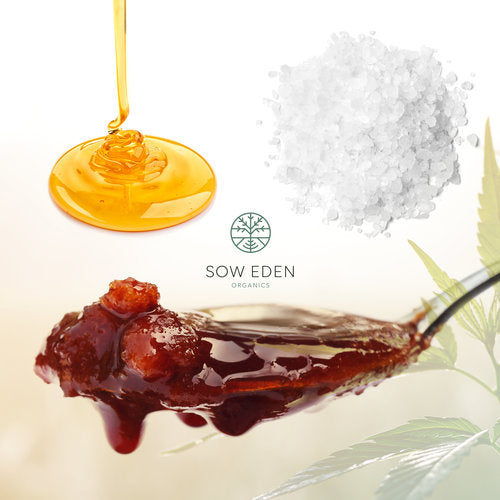
We believe in being realistic, though. CBD isn't a magic bullet or a replacement for proper heart care. The heart-healthiest approach combines several important elements:
First, maintain regular check-ups with your doctor and take prescribed medications as directed. Second, accept heart-friendly lifestyle choices like balanced nutrition, regular movement, and stress management techniques. And when appropriate, consider thoughtfully selected plant-based supplements like CBD as part of your wellness toolkit.
If you're curious about exploring CBD benefits for heart health in your own life, here's our friendly advice:
Have an honest conversation with your healthcare provider, especially if you're managing existing heart conditions or taking medications. Choose only high-quality, third-party tested products from companies you trust. Begin with a modest dose and increase slowly while paying attention to how your body responds. Consistency matters—give your CBD regimen time to work its magic. And remember that CBD works best when paired with other heart-healthy practices.
Heart health isn't a destination you reach once and then stop—it's a lifelong journey of care and attention. By taking a holistic, informed approach that might include CBD alongside other evidence-based strategies, you're giving your cardiovascular system the support it deserves for years to come.
Ready to explore how our specially formulated products might complement your heart health journey? We invite you to learn more about our Heart-Support CBD Collection. Each product is thoughtfully created, backed by science, and designed to fit seamlessly into your heart-healthy lifestyle.
Your path to heart wellness is as unique as you are. We're here to walk alongside you with products that bring together the best of nature and science for your optimal wellbeing.

